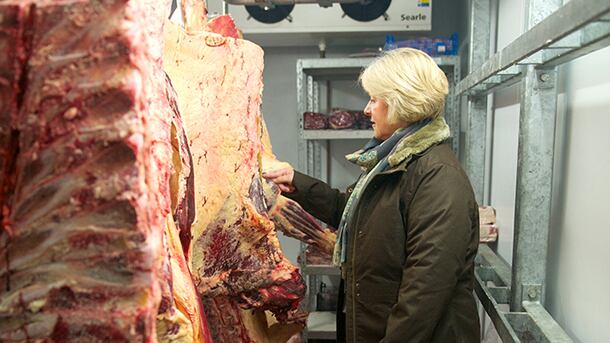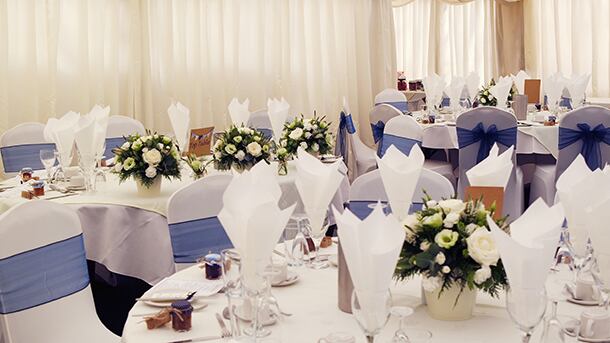The pub
The pub itself is a bit of a maze. We
have two bars, one of them dog-friendly, a 50-cover restaurant and a function room that can seat 80. We also have one of the last few remaining Dorset skittle alleys. The pictures on the walls tell the story of our family business. Outside there are six letting rooms and a children’s play park.
Facts 'n' stats
Name: the Langton Arms
Address: Tarrant Monkton, Dorset
Tenure: Freehold
Licensee: Barbara Cossins
Staff: 18
Annual turnover: c£1m
Wet:dry split: 40:60
GPs: Food 70%-72%, drink 68%
Room rate: £100 per couple
It took us eight months to rebuild after the 2004 chimney fire, which tore through the thatched roof. It was a traumatic experience, and it happened just before the smoking ban, which made it hard to re-establish the business. We went no-smoking when we reopened because I didn’t want the new paintwork stained, and we had to step up our game on food.
The publican
I was a farmer’s daughter and I left school at 16 to work on the family farm before going to agricultural college. I always knew I wanted to do something with food.
I married James Cossins, who is the fifth generation of his family running Rawston Farm, and in 1993 we bought the local pub without knowing a thing about how to run it.
Everyone thought we were mad. I could cost a pint of milk but I had no idea how to cost a plate of food! It was a real learning curve, but I had to get to grips with it.
Running a pub is such a consuming way of life, the hardest industry in the world. The saving grace for me is that I don’t live on-site, so I can switch off.
The trade
We have a 20-mile radius catchment area. People come from Bournemouth and Poole, Blandford and Salisbury, as well as the village. It makes people feel a part of the community just to come in and see other people. Our staff take great care of them and I think that comes over.
We’re dog-friendly – that’s a big thing around here – and we welcome families, which is something I learned is important when I started running the pub with small children myself.
We have a children’s menu – with a colouring-in picture on the other side –that includes sausages from our butchery, burgers and chicken and small roasts on Sundays but we’ll do small portions of anything if we’re asked. There is home-made ice cream, low-sugar drinks and sweets, too – if the staff don’t eat them!
We’re a hub for walking, riding and other country pursuits, and we host meetings of the local farming community. Meetings are important for us. We have two or three a week here.
Apart from that it’s a seasonal business. We do a roaring trade in the summer but, if we have bad weather, it plays havoc with the ford on the way to the pub and can put people off coming here.
The team
There are 18 on the staff including a gardener and a housekeeper for the rooms, and five full-time in front of house. Our bar manager Jackie Owens has been here 19 years and our chef Sebastian Paulinyi has been with us for 10 years. I like to give everyone some responsibility so they feel a part of the business. The younger ones help with social media, for instance.
Eight years ago, we opened a staff house with six rooms and it’s been an absolute godsend. Without it I doubt whether we’d still be here, there are no young people living in the village.
The food
With the BSE crisis and, more recently, the horsemeat scandal, I wanted to do something here to promote farming and educate the public. People should know where their food comes from and support good butchers and good farmers. That’s where my passion comes from.
The Langton is about good honest food, and Seb, the chef, totally embraces the simplicity of our ‘farm to fork’ philosophy and customers
love the story that goes with that – even the vegetarians!
All the beef comes from the family farm, lamb is sourced locally and we have found a new pork farmer at Sturminster Newton. My son is raising turkeys for Christmas this year.
On the menu
- Marinated crispy beef with chilli mayo, dressed leaves – £8.95
- Chicken liver parfait with home-made red onion relish, toast, dressed leaves – £8.25
- Duo of Tarrant Valley game with apricot-stuffed pheasant breast and game sausage, port, silverskin onion and chestnut mushroom sauce, roast potatoes – £17.95
- Whole baked plaice with caper lemon butter, crushed new potatoes – £16.95
- Rawston beef steak pie with hand-cut chips – £16.95
- Faggot, mashed potatoes, red wine and onion gravy – £13.95
- Duo of home-made ice creams with shortbread – £6.95
- Crème brûlée with shortbread – £6.95
Our best-sellers are the old classics – bangers and mash with venison and pork sausages; faggots made the old-fashioned way; ham, egg and chips with hand-carved ham, hand-cut chips and free-range egg. Supermarkets are our competition and they can’t do that.
We use the whole animal, so we have burgers, faggots and pies as well as the prime cuts. Oxtail goes into our stock pot and we serve tongue fritters and braised brisket.
Menus rotate according to the seasons and what we’ve got in the butchery. There’s always something on the menu from our vegetable patch in the garden, too. It might be celeriac, sprouts, parsnips, lettuce or asparagus.
We make a soup out of leftover veg and serve it to diners as an amuse-bouche before the meal. You have to give a bit to gain a bit – that’s always been my philosophy.
The butchery
Five years ago, we opened the butchery in a converted milking shed at the farm because we were fed up with not being able to source local meat – and we didn’t want to carry animal carcasses past customers into the kitchen.
I’ve really enjoyed it. It’s brought the farm and the pub closer together and it’s given us full control over the meat. Once a week, we take animals to the local abattoir, then they are hung at the butchery for 21 to 28 days.
Our butcher Martin Foot is gold dust. He lost his job when the local butcher’s shop closed and spent six months working in our kitchen.
We supply an independent supermarket with ham, faggots and Scotch eggs, plus six other local shops and our new shop at the butchery. And we have a chilled cabinet in the bar for takeaways.

The drink
As with the food, we want to support local businesses. Flack Manor’s Double Drop is permanently on handpump, there is always an English lager, currently Freedom, and Dorset Draft Cider from Purbeck Cider Company.
We have local spirits too, including Conker Gin, Lilliput Gin, Black Cow Vodka and Smugglers Vodka, which is distilled from ale at Bournemouth Brewery. Most of our wine comes from Museum Wines, which has a shop up the road.
The events

Years ago, people couldn’t understand why I kept the skittle alley while other pubs were turning them into extra covers, but it’s been great for corporate events. We have a team that plays against other pubs in Tarrant Valley to raise money for charity, which gives villagers a chance to meet each other. Keeping it was one of the best things I did.
We also have live music here, and cheese and wine evenings, and we work closely with the local Blackmore Vale Magazine to let people know what’s going on.
The pub has a civil ceremony licence for weddings and we are quite flexible on numbers, from 20 to 80 people. There are only six rooms for people to stay over so we work with local B&Bs on that.
The future
We’re planning more theme nights, which seem to be coming back into fashion. And we’re thinking about installing a milk-vending machine that will allow people to fill bottles from a bag-in-box system, but we’ll need a pasteuriser, so that’s a big investment.
